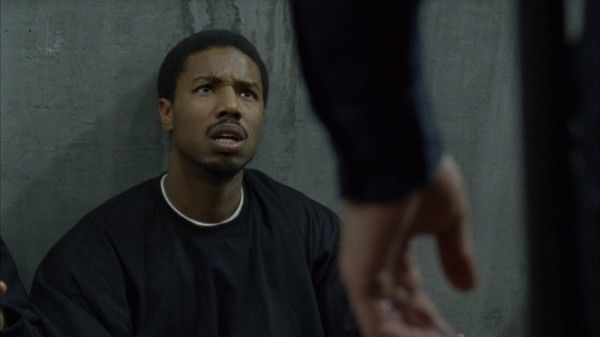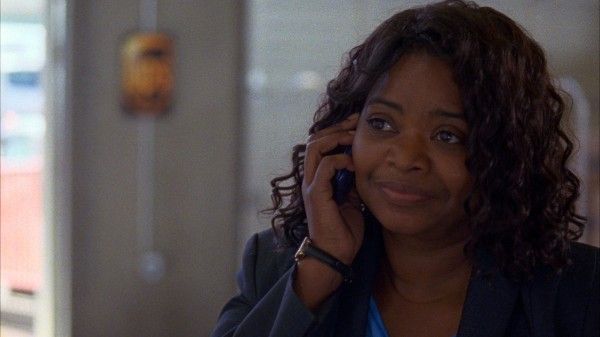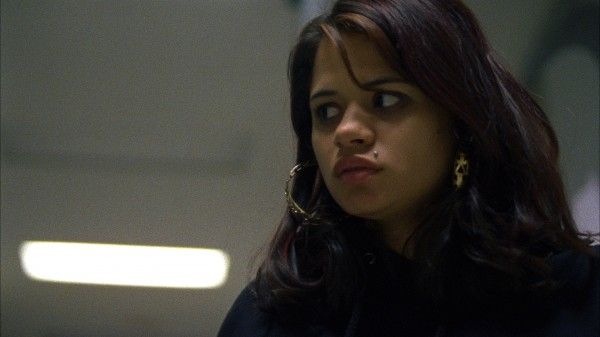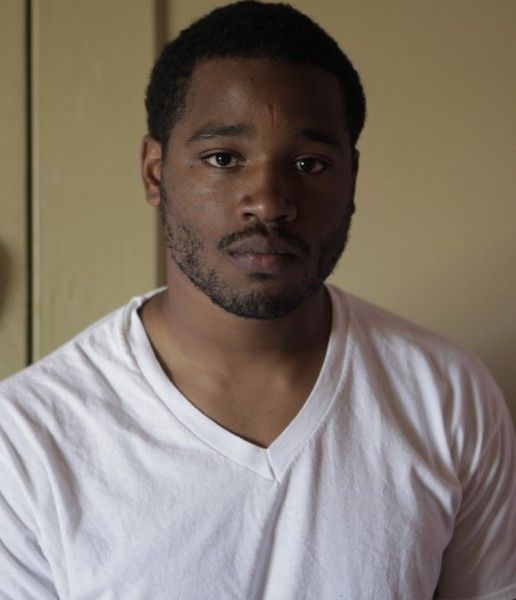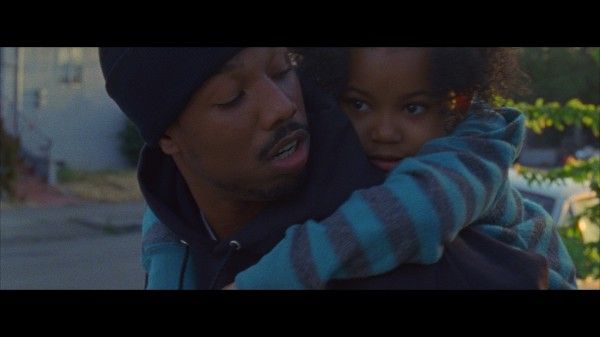Among the many great films premiering this week at Sundance Film Festival is Ryan Coogler’s drama Fruitvale. The writer/director brings us his representation of the final day in the life of Oscar Grant, the 22-year-old Bay Area resident who was shot by a police officer in the Fruitvale BART station on New Year’s Eve, 2008. Michael B. Jordan (Chronicle, Redtails) plays the man who was a father, a fiancé, a son and a friend whose life was tragically ended that fateful day. The film also stars Melonie Diaz as Grant’s fiancé and Octavia Spencer (The Help, Smashed) as his mother.
After the film’s premiere, I was able to speak to director Ryan Coogler about the film. He told me about his connection to this story and how he originally got involved with it, the sense of responsibility he felt to Grant’s family, and what he hopes people take away with them after seeing the film. A previous Sundance Lab participant, Coogler discussed how it feels to be back at Sundance with his finished film, as well as his future plans. Click after the jump to read the full interview.
For people who are not going to see this for a while, tell them a little bit what the film is about, and why you felt compelled to tell this story.
Ryan Coogler: The film is about a 22-year-old Bay Area resident, 22-year-old Bay Area guy who, on New Year’s Eve 2008, kinda goes on a journey, slice of life kind of day-to-day thing. You see him bump up against his family members, his friends, strangers, you know what I mean, some enemies, all on route to a...to a somewhat like...all on route to what will become a major event barrier in history, the 2009 officer involved shooting that happened, you know what I mean. That kinda happens at the end of his day.
And this is completely based on a true story, so how did you go about researching? How did you prepare?
Coogler: Yeah, first thing I did was I got access to public records, and depositions that were involved in the case, and helped build the script from that while I was waiting on access to the family. And then once I got access to the family, I talked to them about what happened that day, and really got some insight on what Oscar did, and talked to them about who he was as a person. I got access to his friends, talked to them about that kind of stuff. His fiancée. His daughter. And from there, I kind of built what his day was like, and who his character was, so that’s where it kind of came from.
Why did you feel that this was an important story to tell? Did you have any connection to it, or you kind of stumbled onto the story? How did you first come across it?
Coogler: I had a major connection to it. Being a young dude like Oscar from the Bay Area, seeing what happened to him really affected me, you know what I mean? It affected the whole community. A lot of protests, a lot of riots, you know. And I happen to be an artist, who can kind of get my voice out to all these strangers through this art form, you know what I mean? So I feel like it was a story that needed to be told, that could make people think about this stuff, maybe bring some growth from it.
And so, you feel like this is politically relevant right now?
Coogler: Socially relevant, not necessarily politically.
Socially relevant.
Coogler: Yeah, it’s socially relevant.
What do you hope that the film will accomplish then?
Coogler: I’m hoping to make audiences think. Make them reflect, know what I mean? Bring them closer to situations like this than they would be if they watch it on the news. Give them a better proximity to it. Make them feel like they know this character, know what I mean?
So for you, the important thing is the character and not necessarily the message of police brutality. Or is that also something that’s important to you?
Coogler: That’s a good question. Yes, but which one is more important to me?
Or, how they’re important to you.
Coogler: Yeah, um. In terms of execution of the film, the characters are the most important thing. That’s also the most important thing a director can focus on. You know, I mean the issue of police brutality is there, it’s intrinsically there in the story, but I think that Oscar’s character in that...neither one is more important than the other. The characters in this film, the humanity of them is what makes that issue something that we need to examine, know what I mean, if that makes sense?
Yeah. In the Q and A after the film, you said something about how he could have either been criminalized by people who knew the story—
Coogler: He was.
-- or he could have been sainted.
Coogler: He was. He was both.
And so you in the film show that he spent time in prison, but you also show his very tender relationship with his daughter. How important was it to you to find and show both aspects of that?
Coogler: Of the utmost important. I mean, without showing everything, without showing all sides of him, he’s not a complete human being. He’s not a complete character. Audiences don’t buy in. I mean like, to recognize yourself in a character onscreen, and to connect with them, you gotta recognize their flaws, they gotta feel like a real person. And Oscar was very much a real person. Like us all, we all struggle with things, and we all succeed at things. You know what I mean? And that’s what his life was about. And that’s what made it so tragic man, was that it was lost, you know what I mean?
You went through the Sundance Lab. How does it feel to be back as a writer/director showing a film here?
Coogler: It’s an incredible feeling. Like when you go through the Sundance labs, as a fellow, you form a family. You form a very special bond, not only with the staff there, who was very nurturing, but also with the other fellows that are here, you know? Yeah one of my fellows I went through with, both of our films went through at the same time, both got financing and everything, and he’s premiering right now, so I wish I could be there.
Which film?
Coogler: Ain’t Them Bodies Saints?
Oh yeah!
Coogler: Yeah. So I wish I could be there with him right now, but it’s...to go through that lab, and then to bring it back and screen it here with all those, all those family members that you made, it was an incredibly rewarding experience man, I’ll carry it with me for the rest of my life.
You’ve been close with Oscar’s family. A bunch of them were here last night. Do you know how they feel about the finished film?
Coogler: I mean, they spoke about it after watching it. And they gave me their blessing before, and they reaffirmed it afterwards. And I think it’s something that we’ll continue to talk about, it’s still very fresh for them. You know, Oscar died, it was only 4 years ago. And they just saw the movie last night. So they’ll think about it more, and we’ll talk about it, we’ll talk about it more. But that was a very important thing to me, that I did right by them, you know what I mean?
And do you think that you’ll continue to be in touch with them?
Coogler: I’ll be in touch with them for the rest of my life, no question. I formed relationships with them. And I value my relationships, the relationships that I form, I’m not the kind of guy that’s gonna talk to you, and once I make the movie I drop off the face of the Earth. Like I live in the Bay Area, I’m planning to never leave, and I plan to be in their lives til I’m gone, you know?
So what’s coming up next for you? Working on something now?
Coogler: I love to write. I’m always writing. But right now I’m focusing on making sure Fruitvale gets seen by as many people as possible. You know what I mean, right now that’s taking all of my energy.
Do you think you’d like to write next, or direct next, or do both? How’d you like directing what you wrote?
Coogler: I’m very familiar with doing that. That’s kind of, how I usually work. But I’ve directed things that other people have written before, and I’ve written things and given them to other directors. So I’m very versatile in terms of that and I enjoy all of it.
And do you think you’ll ever come back to Sundance with a film?
Coogler: I would love to. I mean, it’s been an incredibly rewarding experience.
I have time for one more question. Is there anything you want audiences to take away after seeing your film? If you could give them one message, what would it be?
Coogler: I just hope that, I just hope that it makes them think. You know, about how we treat each other. How we treat people that we love. How we treat people that we don’t know. That they just think about that, think about our relationships.
Click here for all our Sundance 2013 coverage.


